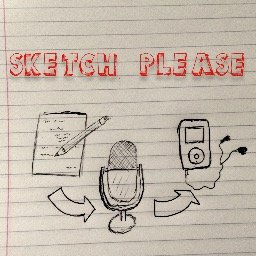Writing for Radio
Writing for radio is a great way for creators to see their ideas brought to life.
Check out these links for advice on how to write for radio
Sitcom Geeks interview with radio comedy producer
In this article James Cary of Sitcom Geeks interviews BBC radio comedy producer Ed Morrish, with some great tips for new writers:
Sitcom Geek podcasts:
Sketch Please – How to write a great audio sketch
We asked Ed from ‘Podcast Adventures’ who produce a monthly sketch podcast – ‘Sketch Please’ – to give us his tips for submitting scripts for podcast and radio. The full article includes specific tips for submitting to the ‘Sketch Please’ show, and can be found here.
 We are thrilled to say that we have gotten a HUGE number of fantastic submissions for our monthly sketch podcast Sketch, Please!, and now that we’ve done three episodes, we thought we would provide some tips and tricks for any prospective sketch writers about what we are looking for. These are not hard and fast rules for sketch writing, but they are some of the things we consider when deciding a running order for the podcast.
We are thrilled to say that we have gotten a HUGE number of fantastic submissions for our monthly sketch podcast Sketch, Please!, and now that we’ve done three episodes, we thought we would provide some tips and tricks for any prospective sketch writers about what we are looking for. These are not hard and fast rules for sketch writing, but they are some of the things we consider when deciding a running order for the podcast.
Who, What, Where? – It may seem rudimentary or obvious, but you would be surprised by the number of sketches we receive that don’t cover this! We have no set, no props and we can’t even see our performers faces. It’s therefore very helpful to establish the setting, who the characters are and what they are doing in the dialogue or sound design of the sketch as early as possible. Once we’ve laid the foundations, we can build from there. It’s hard to care about characters or what they are doing when you don’t know who they are or where they are doing it. So tick “who”, “what” and where” off the to-do list and then have fun with your premise.
Think audio, not video – Again, this should be obvious, but we can’t “watch” the sketch. Yet, very often we receive submissions with stage directions that actively describe the actions of what they are doing rather than what would indicate that practically. We can do some of the leg work for you and think about how to build the soundscape of the action you describe, but there are limits to that when you have not considered how to represent the action audibly. So keep that in mind. Think about each sound individually and how it will build the environment and/or action.
Use the format – Not being able to see the action is actually a blessing. It allows radio comedy to be a lot more versatile and a lot less limiting than it gets credit for. You can jump cut like you can on TV and film. You can have bold characters in incredible settings without having to spend a penny on sets and costumes. As long as you audibly establish the context of the scene, there’s virtually nothing that can’t happen. We’ve had some great sketches already where people are really provoking the listener’s imagination to get their premise across and take the scenes to bizarre and fun places. So have fun with “the theatre of the mind”.
Write for format – We’ve been sent several sketches that are adaptations of TV or stage sketches, or even different types of radio comedy. That is absolutely fine, but at least rewrite it so that it resembles a radio comedy sketch. We try to develop the sketches with their authors, but it’s a bit of a turn off to read a sketch for a YouTube video that would need to be turned upside down to suit our radio show.
Consider the structure – A well-structured sketch is a beautiful thing. The laughs have a kind of tempo. There’s a template to some; they establish the premise, they escalate it three times or so and kick the exit down with a killer punch-line. It’s not a concrete rule and there are other sketches that will successfully break that template, but it’s not a bad guideline. (Further from the above point, you can immediately tell when a sketch has been repurposed from a radio sitcom, TV sketch or a stand-up set because the structure is off.) But we very much enjoy a funny sketch with a strong structural backbone.
Make it fun for the actors – It’s always a plus when we get to record a sketch with some fun roles that our voice actors are going to enjoy. It means that the actor is going to give it their all and the entire process is more enjoyable. If you have a clear idea, by all means add some suggestions for characterisation in the notes.
